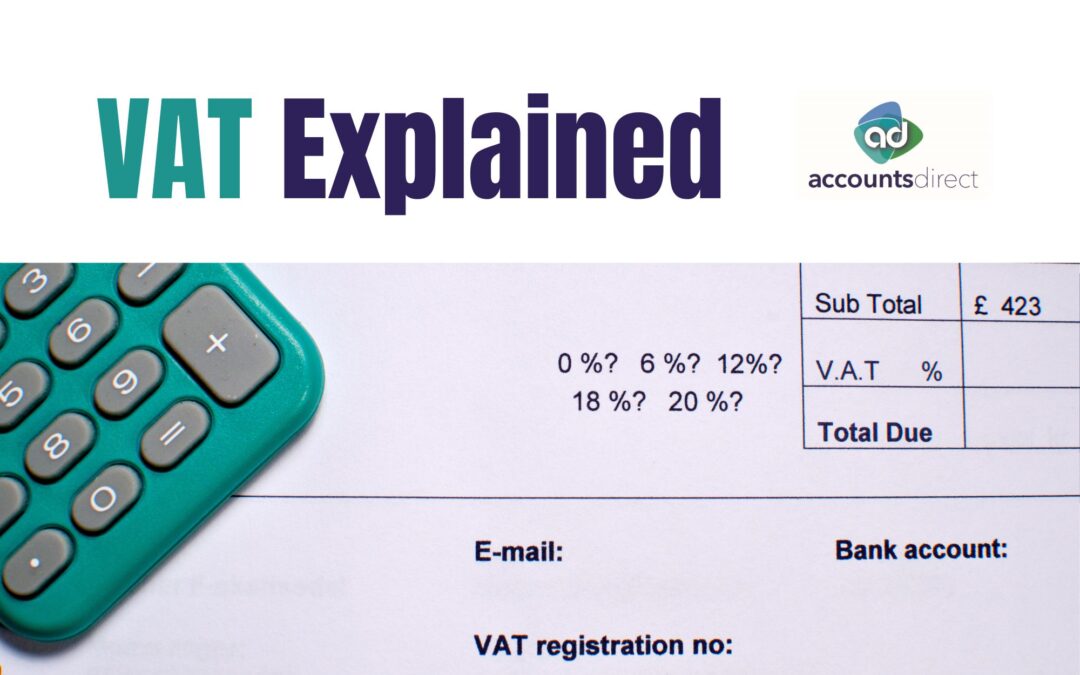Value Added Tax, commonly known as VAT, is an essential concept for many businesses and consumers. But what is VAT, and how does it impact you? This post breaks down the basics, providing a straightforward explanation of VAT.
What is VAT?
VAT stands for Value Added Tax. It’s a consumption tax added to the price of goods and services in the UK. Instead of being directly imposed by the state, businesses collect VAT on behalf of the government.
How Does VAT Work?
At its core, VAT is applied each time value is added to a product or service. This can happen at various stages, including production, sale, or point of consumption.
For example, when a manufacturer produces a product, they pay VAT on the raw materials. When the same product is sold to a wholesaler, the price includes VAT. This pattern continues until the product reaches the final consumer.
Different VAT Rates
In the UK, there are three primary VAT rates:
- Standard Rate (20%): Most goods and services fall under this rate.
- Reduced Rate (5%): Certain goods and services, such as children’s car seats and domestic fuel, are taxed at this lower rate.
- Zero Rate (0%): Some items, like food and children’s clothing, aren’t taxed but still need to be recorded for VAT purposes.
It’s vital to note that some goods and services are exempt from VAT or fall outside the VAT system altogether.
Who Should Register for VAT?
If you run a business with a turnover exceeding the VAT threshold (which can change but was £85,000 as of 2021), you must register for VAT. Once registered, you’ll need to:
- Charge the correct amount of VAT on goods and services.
- Pay any VAT due to HMRC.
- Submit VAT returns.
- Keep VAT records and a VAT account
How is VAT Paid?
Businesses collect VAT when they sell their goods and services. Every quarter, businesses tally the VAT they’ve charged to customers and subtract the VAT they’ve paid to suppliers. The difference is what they owe to HMRC. If a business has paid more VAT than it has collected, it can typically reclaim the difference.
Benefits of Voluntary Registration
Even if you haven’t hit the VAT threshold, registering for VAT can have benefits:
- Reclaiming VAT: Once registered, you can start reclaiming VAT on your purchases, which might reduce costs.
- Business Perception: Being VAT registered can give suppliers and clients the impression that your business is larger or more established than it might be.
However, it also means additional administrative work and the responsibility of charging and remitting VAT.
Common Misunderstandings
Many misconceptions surround VAT. Here are a couple of clarifications:
Not a Business Profit: Just because a business charges VAT doesn’t mean they keep it. They act as a collector for the government.
Global Differences: While many countries have VAT or a similar tax, rates and regulations vary worldwide. Always check local guidelines when doing international business.
Your responsibilities as a VAT-registered business
As a VAT-registered business you must:
- include VAT in the price of all goods and services at the correct rate
- keep records of how much VAT you pay for things you buy for your business
- account for VAT on any goods you import into the UK
- report the amount of VAT you charged your customers and the amount of VAT you paid to other businesses by sending a VAT return to HM Revenue and Customs (HMRC) – usually every 3 months
- pay any VAT you owe to HMRC
The VAT you pay is usually the difference between any VAT you’ve paid to other businesses, and the VAT you’ve charged your customers.
If you’ve charged more VAT than you’ve paid, you must pay the difference to HMRC.
If you’ve paid more VAT than you’ve charged, HMRC will usually repay you the difference.
–
VAT is an integral part of the UK’s taxation system, impacting both businesses and consumers. By understanding the basics of VAT, your business can ensure that it remains compliant, avoid penalties, and make informed decisions.
Always consider seeking advice from an accountant or tax professional (like us!) to navigate the complexities of VAT for your specific business needs. we can prepare and submit your VAT returns every quarter too.
To find out more, contact us here.

